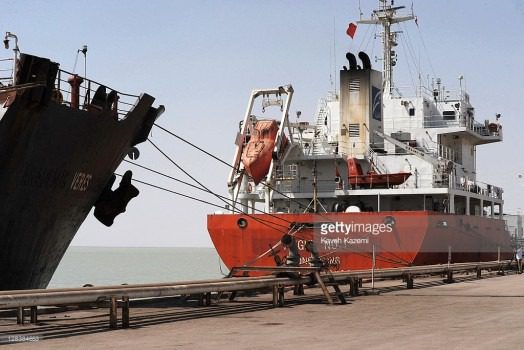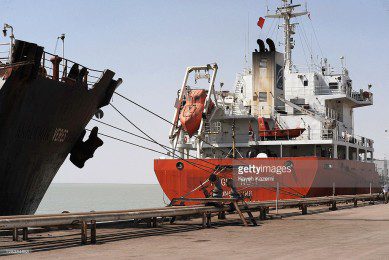Global Issues
Federal Government in Maritime Levies And How Foreign Companies Undercut Us -By Fidelis Nwangwu


In the quest to shore up the economic base of the country, it is a well-known fact that enterprise and business is crucial to this, particularly partnerships between local and foreign firms, which would generate various levels of revenue and taxes for the government.
Yet, with the endemic corruption in the country, many see Nigeria simply in terms of exploitation and the subversion of its regimes of levies and taxation, which unfortunately has several citizens involved. It becomes a lot more painful and an issue of deep concern when foreign firms and business entities are the arrowheads of this subversion, as they concoct all sorts of schemes to dodge their obligation to constituted authorities.
Foreign firms, most times in cohort with Nigerian officials, have been known to devise different shenanigans to avoid meeting their obligations as required by law. In one particularly blatant case, in the maritime sector, an American company with a tainted corporate history, avoided paying taxes and levies running into several billions of naira.
Through an elaborate scheme that involved the registering of series of companies, this corporation undercut the federal government and Rivers State government of levies and taxes, which it was statutorily required to pay. Many foreign companies in the maritime sector cashed in on the previously unregulated sector to rake in millions of dollars, while paying next to nothing in taxes and levies.
But with the enactment of the Nigerian Coastal and Inland Shipping (Cabotage) Act 2003, which regulates the operation of international companies sector that had treated the maritime sector like a bazaar, these entities are now required to find credible local partners to remain in business. Even then, there needs to be a way of ensuring that local companies are not handed the short end of the stick in these partnerships.
One of such partnerships has been between PhoenixTide Offshore Nigeria Limited and Tidewater Marine International, an American firm. The partnership initially operated as a joint venture of a 60/40 ratio, whereby Tidewater was allowed to continue its operations in Nigeria in return for helping its Nigerian partners to build marine capacity. But it later appeared that Tidewater’s only interest was how the law could be circumvented in towards the exploitation of the country. And, when it became clear that the arrangement it had sought was at variance with the law, it took 15 months before it agreed to divest its holding in the company.
On October 1, 2005, under three separate agreements – a blanket bareboat charter agreement (BBC), technical services agreement (TSA) and marketing agreement (MA) – a partnership was created. Under this partnership, Tidewater marine was granted full power of attorney to manage and control PhoenixTide including the handling, management, operations, administration and finances of the company.
However, it was discovered that Tidewater failed to remit its own share of the mandatory 2.2 percentage of profits made by companies in oil and gas business to Nigerian Maritime Administration and Safety Agency (NIMASA) and the Federal Inland Revenue Services (FIRS) in accordance with Cabotage act. And, also it failed to remit taxes on expatriates, worth N4.11 billion to the Rivers State government, while blatantly refusing to disclose its revenue to enable FIRS calculate taxes.
The FIRS initiated an investigation into the failure of the company to remit taxes in October 2012, which is still on-going. Meanwhile, in 2014, the FIRS demanded $14 million unpaid taxes from Tidewater, which the company has been trying to deflect, threatening to sue both NIMASA and the FIRS. Issues involving the undercutting of government levies and taxes led to deep strains in the relationship between Tidewater and the local partner in PhoenixTide.
Hence, in 2011 the EFCC intervened, at the insistence of its Nigerian partner, and Tidewater was accused of several offenses, including money laundering and economic sabotage.
The Managing Director of the company in Nigeria was arrested and detained and was only released after Tidex Nigerian Limited, a local subsidiary of Tidewater Incorporation executed a term of plea-bargain with the payment of US$6million to the Nigerian government and a promise to, from then on, comply with all necessary regulations as they relate to due process in business transactions in Nigeria.
This was not particularly surprising as it is documented that the company has a history of indulging in corporate misconducts. Investigations carried out by Steptoe and Johnson, a Washington based law firm on behalf of the United States Department of Justice indicted Tidewater Marine International Inc., for fraud abroad. Subsequently, the Securities and Exchange Commission charged Tidewater Inc. with violating the Foreign Corrupt Practices Act (FCPA) by paying bribes to foreign government officials in Azerbaijan disguised as payments for legitimate services.
Tidewater was also charged with authorizing improper payments to customs officials in Nigeria that were wrongly recorded as valid expenses in the Company’s records. The commission alleges that Tidewater, directly or through its agents, paid $160,000 in bribes to foreign government officials in Azerbaijan in 2001, 2003 and 2005 in order to manipulate acts and decisions by tax officials to resolve local audits in favor of a Tidewater subsidiary. It further alleges that from January 2002 through March 2007, Tidewater, through a subsidiary, reimbursed approximately $1.6 million to its customs broker in Nigeria used to make improper payments to local Nigerian customs officials. These improper payments were made in order to induce the Nigerian officials to disregard regulatory requirements in Nigeria relating to the temporary importation of Tidewater’s vessels into Nigerian waters. Tidewater improperly recorded these payments as legitimate expenses in its books and records.
Without admitting or denying the SEC’s allegations, Tidewater has consented to a court order permanently enjoining it from future violations of these statutory provisions; and ordering it to pay $7,223,216 in disgorgement plus prejudgment interest of $881,146, and a $217,000 civil penalty. The Commission is not imposing an additional monetary penalty against Tidewater in light of a criminal fine the company agreed to pay to U.S. Department of Justice in a parallel criminal case involving substantially the same misconduct.
But how was Tidewater able to evade the payment of taxes and levies for so long? The answer to the question is in the agreement it signed with PhoenixTide Nigeria Limited.
According to the agreement, the Nigerian partner (Phoenix) will be in-charge of crewing, acquiring local supplies and temporary importation licenses for vessels, expatriate quota for workers and so on, while Tidewater was expected to pass on technology to the de facto Managing Director of PhoenixTide and other Nigerians involved in the business so as to grow local capacity and indigenous skills in accordance with the dictate of the Cabotage Act.
However, PhoenixTide was granted the power of attorney, which essentially gives it the power to run the company in the manner it deemed fit. Without opening its book to its partner, for up to nine years, Tidewater allegedly incurred a contestable liability of up to $40 million in the name of PhoenixTide, which was its vehicle of operation in the oil and gas business from 2004 to 2013. Tidewater has also dragged PhoenixTide to courts in the United Kingdom and Nigeria for the refusal of the local partner to sign the transfer of profit held by Total Nigeria Plc. to it, as stipulated by the Cabotage Act.
However, PhoenixTide argues that before it would sign the documents, Tidewater will have to clear all liabilities in levies and taxes it incurred using its name.
Following the refusal of PhoenixTide to authorise the transfer of the money from the contract with Total, Tidewater, through its Nigerian lawyer, wrote Total, asking to be paid the money while suggesting that it would cover Total against any legal action taken by PhoenixTide.
Total rebuffed this overture, explaining that the contract was signed between it and PhoenixTide and performed in Nigeria and as such it has no direct dealing with Tidewater. Total did not stop there. It approached a Federal High Court to determine whether PhoenixTide or Tidewater should be paid the money.
A judgement by Justice Ibrahim Buba on 8th November 2013 ordered the money – $6,182,435.95 and N1,874,507,771.93 to be paid into an interest yielding account in the name of the Chief Registrar of the Federal High Court.
Tidewater gave notice of appeal but did not follow through with the appeal until 2015. In the meantime, it approached a commercial court in the United Kingdom to institute proceedings to force the chairman and managing director of PhoenixTide to sign the permission authorising Total to pay the money.
Similarly, on March 7, 2014 it filed an ex parte motion at the Federal High Court in Lagos seeking to obtain an order by default of damages and interest on the money, which was still in Total possession, however, the motion was denied.
Curiously, while the matter still lingers, Tidewater announced that it would now commence bidding for contracts through another wholly owned Nigerian company called T1 Marine Services Limited.
Fidelis Nwangwu, a maritime journalist, writes from Lagos.



















